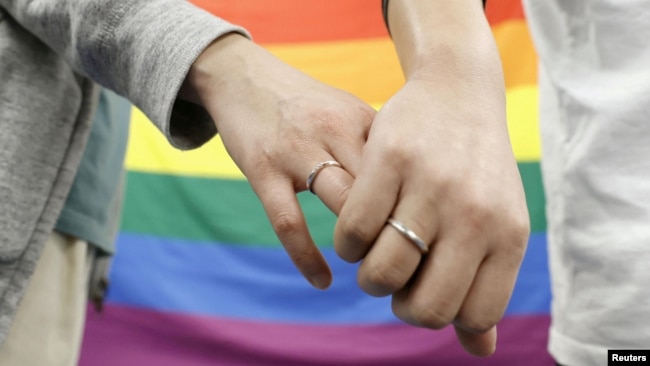日本、同性婚禁止は合憲!
日本の裁判所、同性婚禁止を合憲と判断(和訳)
Japan Court Rules Same-Sex Marriage Ban Is Constitutional
June 23,2022
日本の裁判所が、同性婚の禁止は憲法に違反しないとの判決を下しました。
大阪の地裁が今週下した判決は、同性婚の禁止を違憲とした昨年の札幌地裁の判決に反対するものでした。
活動家たちは、大阪の裁判所が札幌の裁判所の判決に同意することを望んでいました。そうなれば、日本の中央政府に対して、この問題をさらに検討するよう圧力をかけることができたことでしょう。
日本はG7の中で唯一、同性間の結婚を認めていない国です。
大阪では、3組の同性カップルが裁判を起こしました。裁判所は、同性婚の禁止は違憲であるという彼らの主張を却下したのに加え、各カップルに約7,400ドルの損害賠償を求める彼らの要求も拒否しました。
「この国の法制度は本当に機能しているのだろうかと思います。」と原告の一人である坂田真知さんは言います。彼女は米国で米国人のパートナーと結婚しました。二人は8月に出産を控えています。
「この判決によって、私たちは本当に追い詰められる可能性があると思います。」と坂田さんは付け加えています。
日本国憲法は、結婚を”両性の合意”に基づくものと定めています。
しかし、同性愛者の権利活動家たちは、大阪のケースに希望を抱いていました。東京では先週、同性カップルのためのパートナーシップを導入し、日本では同性婚に対する国民の支持が高まっています。
大阪の裁判所は、結婚は異性間のみであると定義しました。また、日本社会では同性婚について十分な議論がなされていないとも述べました。
原告の代理人である三輪明義弁護士は、ロイターに対し、”同性カップルにも通常のカップルと同じものにアクセスできるようにしてほしい”という考えを中心に法的主張を行ったと語ります。三輪氏は、この判決に対して控訴する予定であると述べています。
台湾はアジアで唯一、同性婚を合法化した国です。
現在の日本では、同性カップルは法律上結婚することができません。また、互いの持ち物や財産、同居していた家など、を相続することもできません。また、互いの子供に対する親権もありません。
地方自治体が発行するパートナーシップ登録は、同性カップルが一緒に物件を借りたり、病院の面会権を持つのに役立ちます。しかし、異性間のカップルが享受しているような完全な法的権利を与えてはいません。
先週、東京都は同性間のパートナーシップ協定を認める法案を可決しました。これは、日本の人口の半分以上を占める地方自治体が、同性パートナーシップを認めることを意味しています。
岸田文雄首相は、この問題は日本で慎重に検討される必要があると述べています。しかし、与党である自民党は、この問題を綿密に検討したり、法案を提出したりする予定はないことを示唆しています。しかし、一部の党幹部はこの問題についての改革を支持すると表明しています。
昨年末に東京都が行った世論調査では、約70%の人が同性婚に賛成していることがわかりました。
活動家たちは、同性婚を合法化すれば、社会的にも経済的にも広範囲な効果があると言います。世界第3位の経済大国である日本に、外国企業を呼び込むことができるかもしれない、と言うのです。
柳沢正氏は、投資銀行会社ゴールドマン・サックスに所属しています。また、活動家グループ マリッジフォーオールジャパンの役員でもあります。柳沢氏はロイターに対し、国際的な企業の中には、アジアでの将来の事業計画を決定する際に、同性婚に関する国の立場を考慮するところもあると述べています。
「国際的な企業は、LGBTQに優しくない(場所)には投資したくないのだです。」と彼は述べています。
Japan Court Rules Same-Sex Marriage Ban Is Constitutional
A Japanese court has ruled that the country’s ban on same-sex marriage does not violate the constitution.
The decision this week by a district court in Osaka disagreed with a ruling last year by a Sapporo court that found the ban on same-sex marriage unconstitutional.
Activists had hoped the Osaka court would agree with the Sapporo court’s decision. That could have raised pressure on Japan’s central government to consider the issue further.
Japan is the only Group of Seven nation that does not permit people of the same gender to marry.
Three same-sex couples brought the case in Osaka. In addition to rejecting their claim that the ban on same-sex marriage was unconstitutional, the court denied their demand for about $7,400 in damages for each couple.
"I actually wonder if the legal system in this country is really working," said one of the plaintiffs, Machi Sakata. She married her American partner in the United States. The two are expecting a baby in August.
"I think there's the possibility this ruling may really corner us," Sakata added.
Japan's constitution defines marriage as being based on "the mutual consent of both sexes."
But gay rights activists were hopeful in the Osaka case. Tokyo introduced partnerships for gay couples last week, and public support for same-sex marriage is rising in Japan.
The Osaka court ruled that marriage was defined as being only between opposite genders. The court also said there has not been enough debate on same-sex marriage in Japanese society.
The lawyer representing the plaintiffs, Akiyoshi Miwa, told Reuters his legal argument centered on the idea that "we wanted same-sex couples to have access to the same things as regular couples." He said an appeal of the ruling was planned.
Taiwan is the only Asian country that has legalized same-sex marriage.
Under current rules in Japan, members of same-sex couples are not permitted to legally marry. They also cannot inherit each other's belongings or property, like a house they may have shared. They also have no parental rights over each other's children.
Partnership registrations issued by local governments help same-sex couples rent property together and have hospital visitation rights. But they do not give them the full legal rights enjoyed by heterosexual couples.
Last week, the Tokyo government passed a bill to recognize same-sex partnership agreements. That means local governments covering more than half of Japan's population now offer such recognition.
Prime Minister Fumio Kishida has said the issue needs to be carefully considered in Japan. But his ruling Liberal Democratic Party has signaled that it has no plans to closely examine the matter or propose legislation. Some senior party members, however, have expressed support for reforms on the issue.
A public opinion study by Tokyo’s local government late last year found that about 70 percent of people were in favor of same-sex marriage.
Activists say legalizing same-sex marriage would have far-reaching effects, both socially and economically. They say it could help bring foreign companies to the world's third-largest economy.
Masa Yanagisawa is with investment banking company Goldman Sachs. He is also a board member of the activist group Marriage for all Japan. Yanagisawa told Reuters that some international companies consider a nation’s position on same-sex marriage when deciding on future business plans in Asia.
"International businesses don't want to invest in a (place) that isn't LGBTQ-friendly," he said.
Words in This Story
gender — n. a person's own sense of being male, female, some combination of male and female, or neither male nor female
plaintiff — n. a person who sues another person or accuses another person of a crime in a court of law
corner — v. to force into a place or position from which escape is very difficult or impossible
consent — n. permission for something to happen or be done
gay — adj. sexually or romantically attracted to someone who is the same sex
access — n. permission or the right to enter, get near, or make use of something or to have contact with someone
inherit — v. to receive from someone when that person dies
heterosexual — adj. sexually attracted to people of the opposite sex
LGBTQ — adj. lesbian, gay, bisexual, transgender, and queer/questioning (one's sexual or gender identity)
